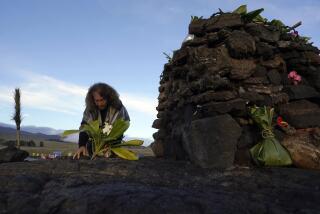Fugitive allegedly ran scams with relatives of presidents
Robert Vesco, the American fugitive who cooked up moneymaking schemes that allegedly involved everyone from Colombian drug lords to the families of U.S. presidents, died in Cuba and was buried almost six months ago, according to an official document.
A burial record at Havana’s Colon Cemetery shows that a man with the same name and date of birth -- Dec. 4, 1935 -- died Nov. 23 from lung cancer and was buried the next day in a private plot. He was 71.
In his lifetime, Vesco was accused of looting hundreds of millions from a Swiss mutual fund, attempting to find U.S. planes for Libya, in a scheme allegedly involving President Carter’s brother Billy, and inventing a drug that he said could cure AIDS.
He was linked to Latin American presidents, Soviet spies, smugglers of high-technology equipment and even the CIA.
And he was good at hiding.
Writer Arthur Herzog, who once interviewed Vesco in Cuba for a biography, called him “a master of disguises,” noting that the con man had long employed elaborate schemes to escape justice.
“I’m not certain he’s dead,” Herzog said from his home in New York, adding that he “didn’t know for sure.” He said he recently spoke with a contact in Havana who indicated that he had talked with Vesco in recent weeks.
Vesco was so crafty that a DNA test on the buried corpse would be necessary to know for certain that it was him, Herzog said.
U.S. officials in Cuba said Monday that they were unaware of Vesco’s death.
Vesco evaded justice in the United States during a quarter-century odyssey through the Caribbean and Central America after fleeing the U.S. in 1972.
It was Cuban courts that finally put him in prison in 1996, convicting him of marketing a drug, which he said could cure cancer and AIDS, without government permission. His business partner, Donald A. Nixon Jr.-- nephew of former President Nixon -- was detained along with Vesco but was later released.
Vesco ended up serving most of his 13-year sentence, though it was not clear when he was released.
He is still wanted in the United States on charges of looting $224 million from investors in a Swiss-based mutual stock fund.
He also was indicted for allegedly contributing $200,000 to Nixon’s 1972 campaign to try to head off a probe by the U.S. Securities and Exchange Commission.
Vesco renounced his U.S. citizenship and traveled around the Caribbean and Central America in a yacht and private planes.
At the end of 1982, he came to Cuba, where he lived off the island of Cayo Largo aboard his yacht with his wife and children.
The couple eventually separated, and Vesco reportedly lived for years with a Cuban woman.
Vesco remained safe from U.S. justice in Cuba, which for decades has been at odds with the United States and refused repeated requests to extradite him.
More to Read
Start your day right
Sign up for Essential California for news, features and recommendations from the L.A. Times and beyond in your inbox six days a week.
You may occasionally receive promotional content from the Los Angeles Times.






